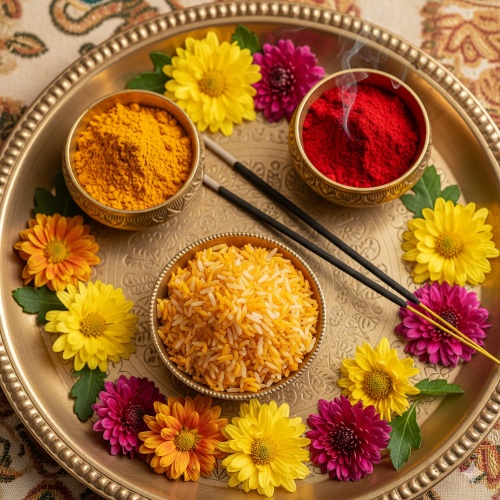Akshata is a Sanskrit word that translates to ‘unbroken’ or ‘uncooked.’ In Hindu puja rituals, Akshata refers to uncooked grains of rice or other cereals offered to the deities. These grains are often kept in a separate container or small dish within the Puja Thali (a plate or tray used to hold the items needed for the worship rituals).
So, let’s discover why we should keep Akshata in the Puja Thali in this article.
Significance Of Akshata
1. Symbol Of Purity:
Akshata is often used to symbolize purity and cleanliness. The grains of rice or other cereals used as Akshata are uncooked and, therefore, free of impurities. By offering Akshata to the deities, devotees seek to invoke their blessings and purify their minds and souls.
2. Symbolizes Abundance:
Akshata is an icon of abundance and prosperity. The grains of rice or other cereals used as Akshata is often associated with the bounty of nature and the blessings of the gods. So, offering Akshata to God means expressing gratitude for the divine blessings one receives and seeking more abundance in their life.
3. Akshata As An Offering:
Akshata is an essential component in many Hindu worship practices, along with other items such as flowers, incense, and lamps. By keeping Akshata in the puja thali, devotees ensure they’ve all the necessary articles for the rituals.

AI-generated image created with Google Gemini, November 13, 2025
4. Akshata As A Part Of Rituals:
Akshata is vital in various Hindu ceremonies, such as the Annaprashan (first feeding of solid food to an infant), the Upanayana (sacred thread ceremony), and the Griha Pravesh (housewarming ceremony). In these rituals, Akshata is often used to summon God’s blessing and mark the beginning of a new phase in life.
5. A Symbol Of Unity:
Akshata is often used in group pujas or ceremonies, where it’s distributed among the participants. By sharing Akshata, devotees express their sense of unity and oneness with each other and the divine.
Use Akshata in any Hindu ritual and ceremony you observe to ensure a blessed new beginning, which fosters a sense of unity and togetherness among the devotees.
Feature Image Credit: Pinterest.




